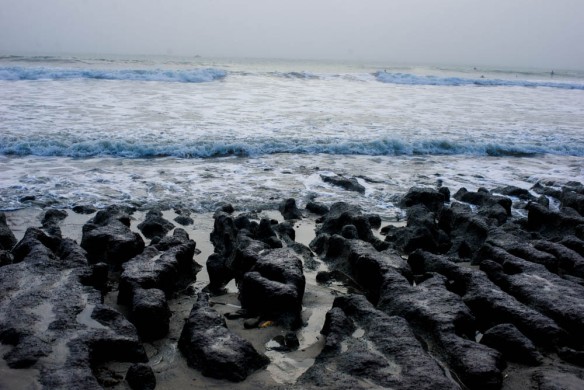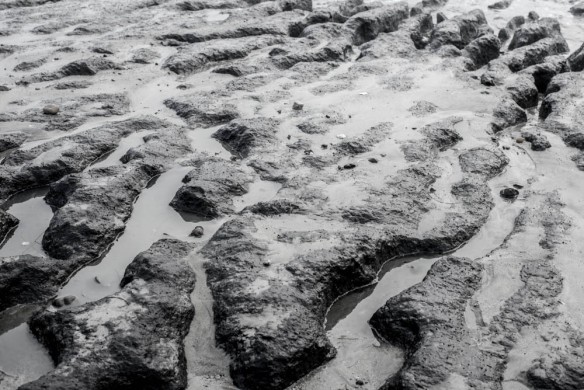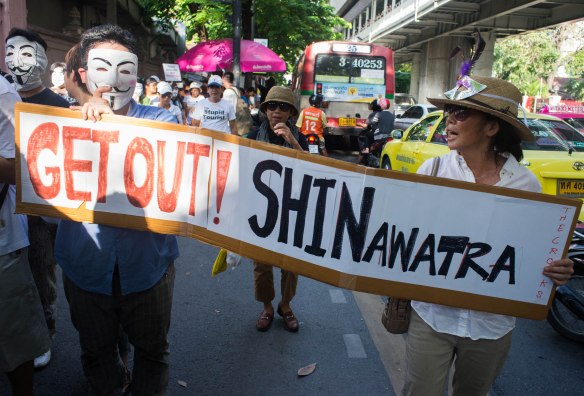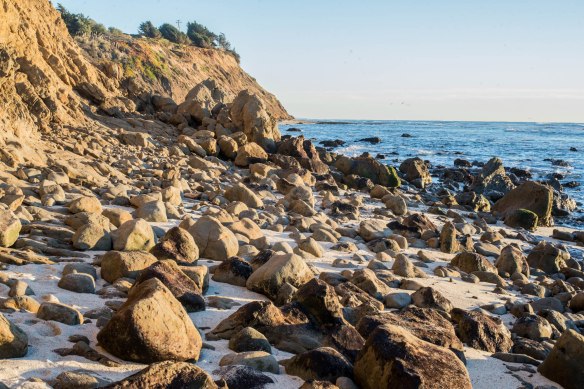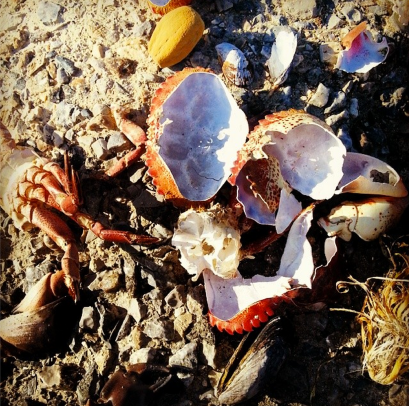
Men in elaborately beaded costumes are seated regally around a torch that burns from pork fat. A boiled, off-yellow chicken sits on the altar table, and dogs sneak around the doorways, waiting. I am watching from just inside the door, out of the rain, and I am wearing a terrifically ugly Panasonic-branded poncho. This is my first Koke Bale harvest ceremony, on the Eastern Indonesian island of Flores.
The Koke Bale is the harvest ceremony practiced by the Lamhalot people who live near Larantuka, the Portugese settlement on the very tip of Eastern Flores, in the Indonesian state of Nusa Tenggara. It’s one of the most remote places I’ve ever been: Flores, not exactly a beacon of tourism, sees most of its visitors concentrated near the dramatic diving sites and malevolent Komodo dragons of the western end of the island.
Getting here requires a lot of bumpy driving through uncertain roads, the consumption of a lot of slightly stale beef rendang, and a certain fondness for isolation: upon arrival, the locals treat you with both deep appreciation and mild caution, as if you might be slightly nuts for making the trip. But it’s worth it. Here in the damp forests of the East, traditional rituals have retained considerable import in daily life, and if you’re lucky, you might be able to see one.
My guide, Evi, discovered that the ceremony was going on by happenstance, after we headed back from the marginally interesting traditional village of Mangarak — about 10 kilometers out from the little fishing village of Larantuka.
Just about everyone here in far Eastern Flores seems to know each other, and that’s how Evi found out about it: after we stopped for gas. A mechanic friend told her that the Koke Bale (whatever that was) was taking place in the settlement of Lem, about 28 kilometers away.
“We have to go!” she said with extreme enthusiasm. “They only have this ceremony once every year!”
“It’s how far?” I asked, remembering the extreme posterior pain I’d suffered a few days earlier during a marathon research session, riding pillion for upwards of seven hours.
“We have to go!” she said, either misunderstanding my trepidation or cheerily blowing past it, as is probably best practice in most circumstances. I took the order and got on the bike. One doesn’t get the chance to see a Florenese harvest ceremony every day.

We drove up the rugged blue coast of eastern Flores to the village, the not-so-distant and seemingly bone dry shore of Solor visible from the road. It was a misty, maritime sort of day, and by the time we arrived at the village, it was raining a bit. Evi parked the bike behind the pink Portugese-style church that dominates the center of town, and I walked away and waited for her. Strains of Eminem, the local musical favorite, carried across the way from a small house. Everyone else appeared to be gone — up at the ceremonial village, which was located at the top of a hill.
As soon as we reached the top of the stone steps, we entered into a hive of very particular activity, centered around three traditional houses, placed at approximately triangle points around a rocky yard. The stones were sacred, and were very much like the megaliths one might associate with the Salisbury Plain, and eager-looking local dogs teetered precariously on seemingly every available stone.

The object of such devout canine affection was a circle of men who in their turn circled around a massive pile of pork, which they were busily putting into palm-leaf packages. Other men tended enormous cauldrons of bubbling pork meat and bones, and I was instantly reminded of cartoon depictions of explorers in pith helmets being toppled into boiling water by hungry locals. Except everyone was much nicer here, and I noticed at least three of the local women taking photos of the proceedings with their Samsung tablets.
“They are going to distribute the meat to the Eight Clans of the area,” Evi explained. “All the clans come here to celebrate the harvest festival, and bring offerings.”
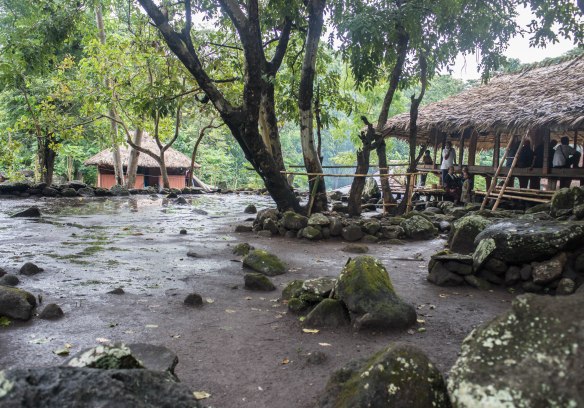
I stood with extreme awkwardness in the middle of the hubbub and tried to parse what was going on: first was that everyone was dressed traditionally in the local-style Ikat, which has pretty little cowrie shells woven into the fibers.
Men wore black and embroidered shirts that reminded me of something fitting for a Nevada cowboy and the aforementioned sarongs in dark shades of maroon and red and black, while the women wore lightly-colored embroidered tops and yellow and orange ikat sarongs.
“It’s just beginning,” said Evi.
“What’s beginning?” I asked, noticing that a quantity of women were heading to the largest house in a long row, carrying wicker baskets full of betel nut and multicolored varieties of rice, some sculpted into elaborate mounds.
“They’re brining the offering to the kekat, the men’s house,” said Evi. “That’s part of what the Eight Clans do this time of year, everyone brings the food together and then they have a big feast.”
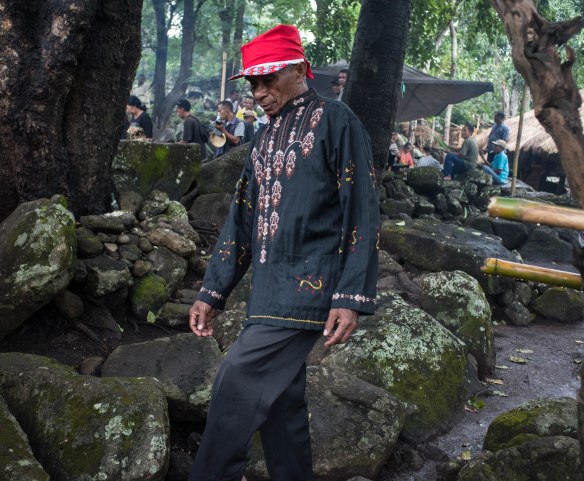
“Hello mister!” a few young girls said to me, in the typical gender-bending fashion of the area, and the women carried wicker baskets past me and smiled in a friendly fashion. I did not know if it was appropriate to take pictures, and I reached for my camera tentatively, hoping to avoid the classic entrapment of the Idiot Photographer grossly cheapening rare cultural events.
“Take a picture!” Evi said cheerily. I raised up the camera. A couple of local men began cheering and getting the attention of the file of women, who looked up in amusement. “Smile for the cammeerraa!” they said. I shot picture after picture, somewhat emboldened, stepping away from my at times perhaps too conservative approach to photographing people I feel I can’t entirely verbally communicate with.

The women laid their offerings at a low table made of bamboo and palm by the side of the men’s house, and gathered around it, looking with what appeared to be extreme interest at what everyone else had brought.
A Southern church social popped into my mind, and a bunch of women standing around a folding acrylic table, looking at the spread.
“That Upton woman brought the ham and cheese casserole again,” one says, shaking her head. “Bless her heart. She just hasn’t got any cooking skills at all.” I imagine this might very well approximate the conversation in the local language I was overhearing, uncomprehending.
“Only the men can enter the men’s house,” Evi said. “It’s not for people like you and me. Maybe it will be better later,” she added, thoughtfully, a small riff of feminism amidst a rather masculine gathering.

I could perhaps see the point: the rain had started to fall heavily again and the men were perfectly dry beneath the heavy roof of the men’s house, while the women and girls (very few young boys were in evidence) huddled beneath the eaves, crowded together in clumps beneath a few luridly pink umbrellas. I shrugged on a massive blue poncho that said “Panasonic” on it. I received at least three different compliments on it immediately.

The gatherings continued to stream in, and then on some cue I failed to notice, a quantity of elderly men dressed in the full Lamhalot ensemble begin walking towards the house on the right side of the triangle-shaped complex, and taking seats within the interior. About twenty men managed to wedge themselves into the rather small bamboo complex and they all sat cross-legged on the floor.
A bottle of arak, inevitably, emerged. The oldest man began to chant swiftly in the Lamhalot language, beginning a call-and-response round, as he spoke for a few seconds and the other men then responded with a brief phrase. It was melodic and sounded very old, the sort of singing-talking that has fallen out of vogue in the more civilized portions of the world — or perhaps, this is why the locals have taken such a shine to Eminem.
The men continued in this fashion for a good 12 minutes, and Evi whispered in my ear. “They are telling the story of the village,” she said. “Once upon a time, the village was very dry, and there was no food or water. A maiden went into the jungle, and she found this jewelry. When she picked up the jewelry, water began to gush. That is why the village is here today.”

The men stopped their chant all of a sudden, and a gaunt man with a luxurious ponytail — indeed, I first mistook him for a woman — stood up, holding a pack of cigarettes. He solemnly distributed a cigarette to each man in turn, and they all silently lit up. The arak was passed around.
The spell broken, they began to talk and laugh again, standing up to leave the small house. They now headed to the left corner of the complex, to another rather modern looking shack. “Now, they go to this house for the final part of the ceremony. But you should stay here, there’s something else going on.”
A group of excited women and children had gathered around a small door in the back of the bamboo hut the older men had just vacated, and I peeked around the corner to see an older man in traditional attire crouched inside a small closet of a room, facing an elderly wooden chest that contained a seemingly random assortment of items: a drum, a few tools, a few wood clubs.

Wax and rice were strewn haphazardly around the room, and he was eating off a plate of stringy chicken and white rice, alternately swigging arak, as the women and children watched him with great interest. He continued in this way for about five minutes, and then all of a sudden he stopped: the women gathered in close. He began depositing rice and chunks of chicken to them all, ladling it into their bare hands. The women took it eagerly, handing small pieces to the children.
“What’s this all about?” I asked Evi, completely stymied.
“It symbolizes what the young woman did when she brought into the jungle. Now, only the women can accept the offering from here,” she noted.
The man inside the closet stood up when the rice was through and left, and the gaunt man with long hair took his place. He opened up a small box and removed a golden necklace and some golden earrings, and then he took a piece of tissue paper and animatedly rubbed the little bits of jewelry, seemingly to clean them.
This finished, he handed the tissue to one woman, and then he repeated the procedure, handing off the tissue to another person, and so on. A few men came to take the pieces of tissue paper as well. All regarded the tissue paper as an item of considerable value.
“The people believe that the jewelry gives good luck, so you take the tissue paper that’s rubbed on it, and it’s lucky,” said Evi. She nodded to the man, and he rubbed the jewerly and gave her own piece of tissue paper. “He’ll show us the jewelry,” she said. “It’s the same jewelry the woman found in the forest.”
The man cheerily held up the jewelry and allowed Evi to photograph it. You may notice I didn’t photograph it. I suppose I felt odd about it. I regret this now. These are the complexities of photographing things and not wanting to offend people, and sometimes making the wrong call.

We left the bamboo hut and proceeded to the smaller house, whereupon I walked into the room and was confronted with a tableaux of three men in traditional costume, a vat of rice, a boiled chicken, and an enormous flaming torch made of pork fat. Just as the women had done, now it was largely men gathering to receive a bit of rice and a bit of chicken. Rice was inevitably all over the floor.

The chicken was nearly done for now, and I took a few photographs, watching as the rain outside continued to pour. And suddenly – everything happens rather suddenly in this ceremony – the man with the torch headed for the door, as I leapt aside in fear of having my blue plastic poncho painfully melted right over my back. He was headed for the stone circle again.
I followed, and a few of the older men eagerly gestured for me to take photos. One man neatly decapitated a coconut with a machete, and broke it over a waiting pile of rice and meat, the coconut water running into the stone. The torch-bearer waved the flame over the small mound. At another rock, the two did it again.
This duty complete, they took the torch in the pouring rain inside the men’s house, mounting it in the center of the room.
A dog sprang up and swiftly devoured both offerings on the stone, and no one seemed to care.




